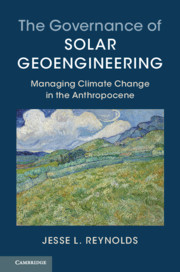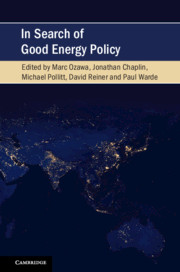Refine listing
Actions for selected content:
2285 results in Ebooks in ecology and environment
1 - Introduction
-
-
- Book:
- In Search of Good Energy Policy
- Published online:
- 10 June 2019
- Print publication:
- 20 June 2019, pp 1-22
-
- Chapter
-
- You have access
- HTML
- Export citation
6 - Anthropology and Energy Policy
- from Part I - Multidisciplinary Perspectives
-
-
- Book:
- In Search of Good Energy Policy
- Published online:
- 10 June 2019
- Print publication:
- 20 June 2019, pp 69-75
-
- Chapter
- Export citation
12 - Rethinking the Environmental State: An Economic History of the Swedish Environmental Kuznets Curve for Carbon
- from Part II - Cases and Multidisciplinary Responses
-
-
- Book:
- In Search of Good Energy Policy
- Published online:
- 10 June 2019
- Print publication:
- 20 June 2019, pp 139-164
-
- Chapter
- Export citation
22 - Responses and Final Thoughts
- from Part III - Multidisciplinary Cases
-
- Book:
- In Search of Good Energy Policy
- Published online:
- 10 June 2019
- Print publication:
- 20 June 2019, pp 336-350
-
- Chapter
- Export citation
Part II - Cases and Multidisciplinary Responses
-
- Book:
- In Search of Good Energy Policy
- Published online:
- 10 June 2019
- Print publication:
- 20 June 2019, pp 99-272
-
- Chapter
- Export citation
19 - Introduction to Multidisciplinary Approaches
- from Part III - Multidisciplinary Cases
-
-
- Book:
- In Search of Good Energy Policy
- Published online:
- 10 June 2019
- Print publication:
- 20 June 2019, pp 275-281
-
- Chapter
- Export citation
7 - History: A Long View?
- from Part I - Multidisciplinary Perspectives
-
-
- Book:
- In Search of Good Energy Policy
- Published online:
- 10 June 2019
- Print publication:
- 20 June 2019, pp 76-81
-
- Chapter
- Export citation
4 - Good Energy: Philosophical Perspectives
- from Part I - Multidisciplinary Perspectives
-
-
- Book:
- In Search of Good Energy Policy
- Published online:
- 10 June 2019
- Print publication:
- 20 June 2019, pp 45-56
-
- Chapter
- Export citation
5 - Public Theology – ‘Grounded’: An Energy Policy Rooted in Human Flourishing
- from Part I - Multidisciplinary Perspectives
-
-
- Book:
- In Search of Good Energy Policy
- Published online:
- 10 June 2019
- Print publication:
- 20 June 2019, pp 57-68
-
- Chapter
- Export citation
9 - Legal Aspects of Energy Policy
- from Part I - Multidisciplinary Perspectives
-
-
- Book:
- In Search of Good Energy Policy
- Published online:
- 10 June 2019
- Print publication:
- 20 June 2019, pp 89-98
-
- Chapter
- Export citation

The Governance of Solar Geoengineering
- Managing Climate Change in the Anthropocene
-
- Published online:
- 11 June 2019
- Print publication:
- 23 May 2019

In Search of Good Energy Policy
-
- Published online:
- 10 June 2019
- Print publication:
- 20 June 2019
PART A - STATE OF THE GLOBAL ENVIRONMENT
-
- Book:
- Global Environment Outlook – GEO-6: Healthy Planet, Healthy People
- Published online:
- 31 May 2019
- Print publication:
- 06 June 2019, pp 104-105
-
- Chapter
-
- You have access
- Open access
- Export citation
Chapter 8 - Land and Soil
- from PART A - STATE OF THE GLOBAL ENVIRONMENT
-
- Book:
- Global Environment Outlook – GEO-6: Healthy Planet, Healthy People
- Published online:
- 31 May 2019
- Print publication:
- 06 June 2019, pp 200-233
-
- Chapter
-
- You have access
- Open access
- Export citation
Co-Chairs' Foreword
-
- Book:
- Global Environment Outlook – GEO-6: Healthy Planet, Healthy People
- Published online:
- 31 May 2019
- Print publication:
- 06 June 2019, pp xxviii-xxviii
-
- Chapter
-
- You have access
- Open access
- Export citation
Chapter 15 - Land and Soil Policy
- from PART B - POLICIES, GOALS, OBJECTIVES AND ENVIRONMENTAL GOVERNANCE: AN ASSESSMENT OF THEIR EFFECTIVENESS
-
- Book:
- Global Environment Outlook – GEO-6: Healthy Planet, Healthy People
- Published online:
- 31 May 2019
- Print publication:
- 06 June 2019, pp 372-397
-
- Chapter
-
- You have access
- Open access
- Export citation
Chapter 4 - Cross-cutting Issues
- from Setting the Stage
-
- Book:
- Global Environment Outlook – GEO-6: Healthy Planet, Healthy People
- Published online:
- 31 May 2019
- Print publication:
- 06 June 2019, pp 74-103
-
- Chapter
-
- You have access
- Open access
- Export citation
Chapter 12 - Air Policy
- from PART B - POLICIES, GOALS, OBJECTIVES AND ENVIRONMENTAL GOVERNANCE: AN ASSESSMENT OF THEIR EFFECTIVENESS
-
- Book:
- Global Environment Outlook – GEO-6: Healthy Planet, Healthy People
- Published online:
- 31 May 2019
- Print publication:
- 06 June 2019, pp 300-321
-
- Chapter
-
- You have access
- Open access
- Export citation
PART C - Outlooks and Pathways to a Healthy Planet with Healthy People
-
- Book:
- Global Environment Outlook – GEO-6: Healthy Planet, Healthy People
- Published online:
- 31 May 2019
- Print publication:
- 06 June 2019, pp 460-461
-
- Chapter
-
- You have access
- Open access
- Export citation
GLOBAL ENVIRONMENT OUTLOOK GEO-6 HEALTHY PLANET, HEALTHY PEOPLE
-
- Book:
- Global Environment Outlook – GEO-6: Healthy Planet, Healthy People
- Published online:
- 31 May 2019
- Print publication:
- 06 June 2019, pp iii-v
-
- Chapter
-
- You have access
- Open access
- Export citation
